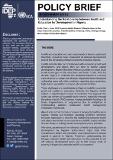Technical handbook on composite wheat flours : processing of tropical flours

Vue
Download
Date
1998Author(s)/Corporate Author (s)
United Nations. Economic Commission for Africa;United Nations. Economic Commission for Africa;
Metadata
Afficher la notice complèteRésumé
The technology of composite flours, in which imported wheat flour is totally or partially substituted by flours from locally grown cereals, tubers and legumes, is now well established. This technology represents a valuable option in minimizing the negative effects resulting from increasing imports of wheat by African countries. the application of this concept at country level requires proper formulation, adaptation of technology., standardization of the new products to be fabricated and related technological training. The Technical Handbook on Composite Flours addresses these problems through its four parts. The Model Pre-feasibility study provides basic guidelines for launching a composite flours programme and can be adapted to various situations prevailing in any country of the region. The second part provides new processing techniques of staple cereals in Africa, including equipment for the industrial processing. The third part summarizes information currently available on existing standards, and is intended to serve as a guide for the elaboration of national standards based on local conditions such as consumer’s acceptability. Finally the presentation goes beyond the technique of bread production to include essential practices in bakery sanitation and management.
Citation
“United Nations. Economic Commission for Africa; United Nations. Economic Commission for Africa (1998). Technical handbook on composite wheat flours : processing of tropical flours. Addis Ababa. © UN. ECA. https://hdl.handle.net/10855/43733”Collections
- Agriculture [3023]
Related items
Showing items related by title, author, creator and subject.
Understanding the Relationship between Health and Education for Development in Nigeria
United Nations. Economic Commission for Africa; United Nations. Economic Commission for Africa. African Institute for Economic Development and Planning(IDEP); United Nations. Economic Commission for Africa; United Nations. Economic Commission for Africa. African Institute for Economic Development and Planning(IDEP)
“Kalu, Chris U.; Abdul-Raheem, Tajudeen; United Nations. Economic Commission for Africa; United Nations. Economic Commission for Africa. African Institute for Economic Development and Planning(IDEP); United Nations. Economic Commission for Africa; United Nations. Economic Commission for Africa. African Institute for Economic Development and Planning(IDEP) (2018-05). Understanding the Relationship between Health and Education for Development in Nigeria. Policy Brief. No. 007, 4 p.: ill.. Addis Ababa:. © UN. ECA,. https://hdl.handle.net/10855/49836”
Report of a mission to a brainstorming session on the preparation for women's meeting and mainstreaming of gender in the process of the international conference on the great lake Nairobi, Kenya, 16 February 2004
United Nations. Economic Commission for Africa. African Centre for Gender and Development; United Nations. Economic and Social Council; United Nations. Economic Commission for Africa. African Centre for Gender and Development; United Nations. Economic Commission for Africa.; United Nations. Economic and Social Council
“Tiagha, Hannah; United Nations. Economic Commission for Africa. African Centre for Gender and Development; United Nations. Economic and Social Council; United Nations. Economic Commission for Africa. African Centre for Gender and Development; United Nations. Economic Commission for Africa.; United Nations. Economic and Social Council (2004). Report of a mission to a brainstorming session on the preparation for women's meeting and mainstreaming of gender in the process of the international conference on the great lake Nairobi, Kenya, 16 February 2004. Addis Ababa :. © UN. ECA,. https://hdl.handle.net/10855/40625”
Report of mission to Accra 16-27 November 2004
United Nations. Economic Commission for Africa. African Centre for Gender and Development; United Nations. Economic and Social Council; United Nations. Economic and Social Council; United Nations. Economic Commission for Africa. African Centre for Gender and Development; United Nations. Economic Commission for Africa.
“Tadria, Hilda; United Nations. Economic Commission for Africa. African Centre for Gender and Development; United Nations. Economic and Social Council; United Nations. Economic and Social Council; United Nations. Economic Commission for Africa. African Centre for Gender and Development; United Nations. Economic Commission for Africa. (2004-11). Report of mission to Accra 16-27 November 2004. Addis Ababa :. © UN. ECA,. https://hdl.handle.net/10855/25563”



